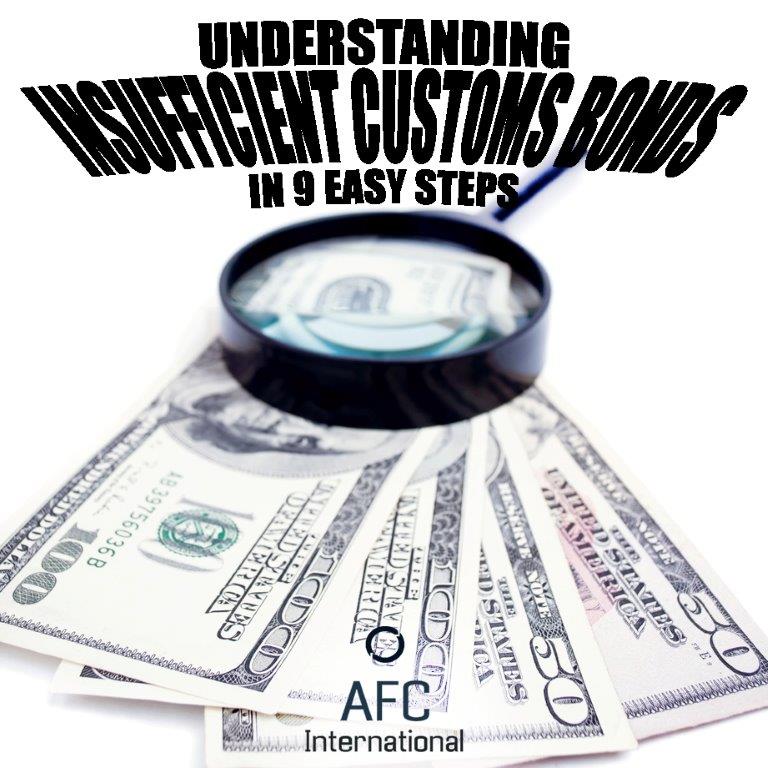When you are importing merchandise into the United States, you must provide a security guarantee that you will comply with the country’s rules and regulations. Insufficient customs bonds can be the import deal breaker when attempting to import your goods across the country’s borders. Follow our guide to learn everything you need to know to avoid insufficient customs bonds.
What is a Customs Bond?
A customs bond is a contractual agreement between U.S. Customs and Border Protection (CBP), the importer of record and the surety company. A customs bond ensures the CBP will be paid the duty and taxes owed to them and the importer will adhere to the rules and regulations of the CBP.

When is a Customs Bond Required?
When you are importing merchandise into the U.S. for commercial purposes with a value of more than $2,500, you must post a customs bond to make sure all duties, taxes, and fees due to the federal government are paid.
Importers and warehouse/facility operators should obtain custom bonds to secure shipments and make sure warehouse facilities are bonded.
Where Can I Obtain a Customs Bond?
Custom bonds can be obtained through sureties licensed by the U.S. Treasury Department. Review a list of custom bonds to learn more. Click on the “Request a Quote” link to get a quote for a Customs Bond.
Customs Bonds start at a minimum $50,000. If the duty, taxes and fees you pay are high, Customs may require a higher bond. Review the parameters for setting custom bond amounts.
What’s next, you might ask? Figure out the difference between single entry and continuous bonds.
Single Entry Bond versus a Continuous Bond?
A single entry bond can be used if you are completing one transaction and if you import goods only occasionally.
A continuous bond is much more cost effective and should be used if you import on a regular basis through various ports of entry.
So how do those bonds become insufficient? Read on.
Why are Some Customs Bonds Declared Insufficient?
A customs bond is deemed insufficient if an importer is paying more in duty, taxes and fees than the current bond is written to cover.
The current trade war with China and the increased duties associated with it are exhausting the bond coverage of many Customs bonds.
For example, a bond is calculated at 10 percent of the total duty, taxes and fees paid annually. If the imported duty, taxes and fees exceed 10 percent, then you have an insufficient customs bond. An insufficient bond cannot be used for entries any longer, which means your shipments can’t be cleared and will be held at the port location until a new sufficient bond is filed and issues are addressed. Continuous bonds are typically the bonds that are deemed insufficient.
We outline the reasons for insufficient customs bonds below.
What are the Reasons for an Insufficient Customs Bond?

Continuous bonds are rendered insufficient for the following reasons:
- Invalid or “non-deliverable” addresses for any entity using the bond
- Not complying to a formal demand letter to increase the bond amount from the CBP by the deadline
- Outstanding debt related to any bond entities (unpaid bills and debit vouchers)
- Failure to comply with Office of Administration mandates
- Not providing required bond paperwork
- Invalid importer of record number
- Failure to deposit proper cash-in-lieu of surety for the continuous bond
- Missing bond paperwork
- Not complying to a rejection of a termination request
- CBP calculates 10% of your annual duty, taxes and fees to be greater than your existing bond.
Importers should also realize that insufficient bond warning notice is not required. Continuous bonds can be labeled insufficient without any advance notice to importers.
How Do I Remedy Cases of Insufficient Customs Bonds?
Insufficient customs bonds will not be returned to sufficient status until all issues with the bonds are addressed with the U.S. Revenue Division. You can address insufficient bond issues by calling your Customs Broker or emailing cbp.bondquestions@dhs.gov.
When a bond is deemed insufficient, the bond needs to be terminated, a process that takes at least 15 days. Bonds are not returned to sufficient status until all issues outlined by the Revenue Division are resolved.
So how do you avoid insufficient bonds? We have you covered.
How Do I Avoid Insufficient Customs Bonds?
The following tips can help you prevent bond insufficiency:
- Post the proper bond amount
- Increase bond amounts as needed
- Monitor your bond’s activity to make sure the amount is still suitable
- Address issues with claims quickly
- Have the proper address and updated contact information
What Happens if Insufficient Bonds Are Not Resolved?

If continuous bonds are kept in use by importers without resolving the insufficient issues outlined by the Revenue Division, the following actions may be taken:
- The release of goods will be stopped.
- Other continuous bonds an importer may be using will be evaluated and will also likely be labeled insufficient.
- The importer record may be voided.
Licensed Customs Brokers can help you avoid the hassles of insufficient bonds.
Connect with a Customs Broker
If you utilize the services of a Licensed Customs Broker, a bond can complete and secure a transaction. Customs brokers can also help you avoid the hassle of insufficient customs bonds.
Connect with a customs broker that has the experience you need to handle the details and make importing easier on you. Customs Brokers can also help you increase bond amounts and update contact information to avoid insufficient bond hurdles.


Leave a Reply
You must be logged in to post a comment.